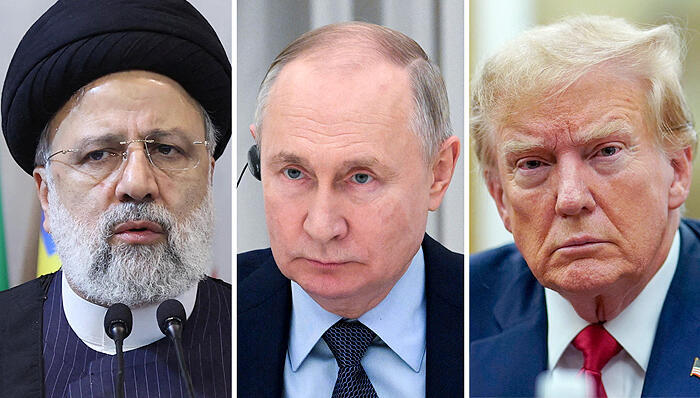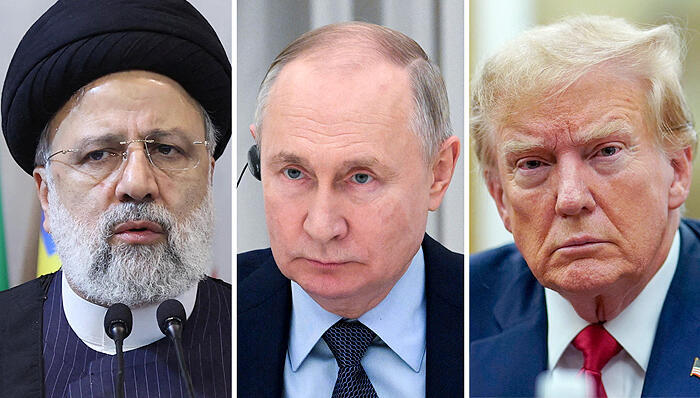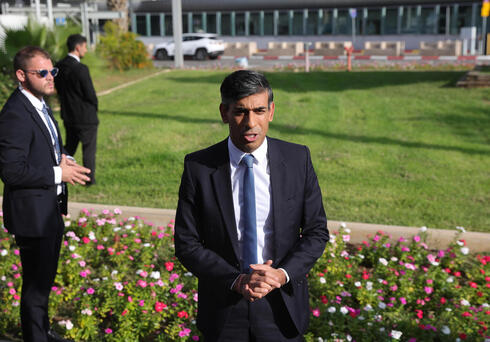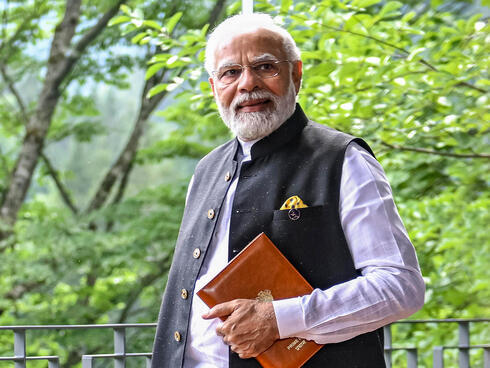
Rocking the vote: 2024 will be biggest and most critical election year ever
From Taiwan and Britain to India and Iran, nearly half of the global population will go to the polls this year. In the democratic countries, the elections will be held under the shadow of a heavy fear of the strengthening of extremist candidates, the most prominent of which is former US President Donald Trump
Following a year full of economic crises, inflation and high interest rates that harmed the recovery from the coronavirus, and wars that are still raging in Ukraine and Gaza, the world will now experience an unprecedented year in terms of the scope of the election campaigns that will take place globally. Starting in Taiwan this month and ending in the United States in November, at least 40 countries will elect leaders this year.
According to Bloomberg calculations, the total number of voters who will go to the polls represent 41% of the world's population and 42% of the global GDP.
The range of countries whose citizens will go to the polls this year is huge. They include resource-rich countries such as Venezuela and Indonesia, South Sudan, which suffers from political instability, as well as Tunisia, where the Arab Spring was born, and European countries, including Austria, Belgium and the United Kingdom. The fear clouding the elections in Europe is the further strengthening of populist and xenophobic nationalist movements, as happened in 2023 in Italy, the Netherlands and Slovakia. In the United States, the possible rise of Donald Trump raises fundamental concerns about the continued crushing of the foundations of democracy in the world's largest economy, a trend he started in his first term.
America is preparing for another round of Trump
Former President Donald Trump successfully survived two impeachment proceedings, tried to forcefully prevent the transfer of the presidency to Joe Biden when he lost in 2020, has dozens of criminal charges pending against him and his critics warn that in his second term he plans to rule as an autocrat. Still, Trump is beating Biden in opinion polls, even though his candidacy was disqualified in Colorado and Maine, and he is making an unimaginable comeback three years after he seemed to have been completely humiliated. The biggest fear of his critics is, as mentioned, his unbridled offensive on the foundations of democracy.
Already, about seven out of ten Americans believe that the status and strength of democracy has deteriorated in recent years. If it is not possible for Biden to defeat Trump, leaders around the world, led by Russian President Vladimir Putin and Chinese President Xi Jinping, may conclude that this is the beginning of the end for democracy. A Trump victory threatens to disrupt the world order and tip the scales in favor of dictatorships and authoritarian regimes.
The critics of the 77-year-old Trump emphasize that there is no need to guess what he will do in his second term, as this can be clearly learned from the moves he made during the first term. The goal now, they say, is to preserve the foundations of the constitution for four more years. For example, in the first phase of his term, he is expected to complete the goals he failed to achieve in his previous term: among other things, banning Muslims from entering the United States, imposing punitive measures on cities that will serve as refuge for such immigrants, and completing the construction of a border wall with Mexico without the approval of Congress.
In all the previous attempts he made to implement these moves, Trump encountered strong constitutional resistance. Therefore, his critics come to the conclusion that the judicial system represents the most significant obstacle facing Trump's efforts to destroy the foundations of the constitution and the hope is that these institutions will continue to stand in his way yet again. Another assumption is that if he is re-elected, Trump will try to go further in his attempts to wield more power over the FBI and the Department of Justice. In this case, the courts will not be able to do much to prevent this, observers claim, due to the strong position of the executive branch which may prevail over the constitution in certain cases.
Britain is in economic stagnation
Britain is entering an election year in a politically tumultuous time. Since 2019, three prime ministers have held office in the UK, with the last one, Rishi Sunak, taking office only about a year ago.
Sunak was chosen to replace Liz Truss who survived in office for only 44 days (the shortest tenure in UK history) and resigned following the presentation of a failed economic plan. Truss replaced Boris Johnson, who won the last election, but was forced to resign in July 2022 amid publicized scandals.
Sunak has yet to announce an official date for the election, and the reason for this is probably related to public opinion polls that indicate that the Conservatives are likely to lose power to Labor led by Keir Starmer. According to a survey published by the Observer newspaper about two weeks ago, Labor wins 40% of the votes compared to 27% for the conservatives. "The feeling is that most of the conservative members of parliament just gave up. Many of them no longer come to parliament," a member of the shadow government told CNN.
At the end of last week, Sunak released his year-end message, which sounded like part of an election campaign. He promised a "brighter future" and pledged to continue strengthening the economy "by reducing debts, lowering taxes and rewarding hard work." However, Sunak faces a number of obstacles, including the planned strike of the junior doctors, the cost of living that continues to rise, and the delays in implementing immigration reform.
On the economic front, Sunak is having trouble leading Britain to growth. In addition, he is facing growing frustration within his party, especially among the right wing, after bringing back former Prime Minister David Cameron in November as foreign secretary. Cameron is considered a relatively liberal figure in the party. His comeback was actually a result of the stormy demonstrations that took place in London in the background of the war in Gaza. Following an article published by the Minister of the Interior Suella Braverman, in which she accused the police of a stricter attitude towards right-wing demonstrators than the pro-Palestinians - she was removed from her position, which triggered a domino effect of appointments.
India persecutes dissidents
In April, elections will be held in India, the most populous democratic country in the world, with approximately 1.4 billion citizens. Of these, 600 million eligible voters will determine whether Prime Minister Narendra Modi will be elected for a third term.
Modi, who is the head of the BJP party, is very popular among the public and is considered the leading candidate to win. In addition, his party promotes a Hindu-nationalist agenda that gives it widespread support among the Hindus who make up the majority in India, especially in the north. "The general feeling is that the BJP's victory in the election is almost certain at this point," Neelanjan Sircar, a researcher at the Indian Center for Political Science, told The Guardian. "The question is which factors will affect the scope of this victory."
Modi was elected for the first time in 2014, mainly against a background of disgust with the previous government. In 2019, Modi was elected for a second term, this against the background of increasing nationalist sentiment following a terrorist attack in the country a few months before the elections and the military response he initiated against Pakistan. Despite his popularity, there is also quite a bit of criticism directed at Modi, based on the claim that he has damaged the democratic foundations in India. Since coming to power, he has worked to centralize power and at the same time undermined the independence of the judiciary, acted against an independent press and reduced the power of parliament to criticize the government. According to the claim, he even used government offices to arrest political opponents and is responsible for assassinations of opponents who fled India.
As a result, concerns about possible fraud in the elections have already begun to surface. Another threat to his rule is the association of 28 opposition parties under one roof called INDIA. The main fear among the opponents is that a third term of Modi will lead to further erosion of human rights, especially of the approximately 200 million Muslims living in the country. On the other hand, his supporters believe that thanks to him, India will become the third largest economy in the world.
Meanwhile, Modi's party is not taking any risks and has started a campaign during which senior government officials will travel across the subcontinent. The goal: publicizing the government's achievements, including India becoming the first country in the world to land a spacecraft on the south pole of the moon in August. The campaign will also be based on Modi's popularity. The Ministry of Defense is currently busy setting up 822 "selfie stations" at memorial sites, museums, train stations and tourist sites, where you can take a picture with a cardboard figure of Modi. The initiative was criticized for using government resources and budgets for election purposes.
Russia is in Putin's hands
Elections will also be held in Russia this year, and there, as in the United States, there is a candidate who is over 70. However, it is unnecessary to call Vladimir Putin a "candidate", since there needs to be someone to face him, and this is not the case in Russia in 2024. Despite the announcement that elections will be held for the first time over a three-day period (March 15-17), they could just as well have been held for an hour. Officially, other names besides Putin will appear on the ballots, but these will be stooges pre-selected by Putin and his associates.
Those who have not yet understood this can ask journalist Yekaterina Duntsova, who announced her candidacy for the presidency and a few days later was summoned to the prosecutor's office for questioning, and the bank account she opened to receive campaign donations was blocked. Those who were still not convinced could join the search team for Alexei Navalny, who is serving a 30-year prison sentence. Navalny disappeared in early December from his prison in Moscow and was found last week in one of Stalin's gulags in Siberia.
In the absence of candidates against the president for more than two decades, and given polls that indicate overwhelming support of 77% (those polled were asked about the level of satisfaction with Putin's performance and the level of trust they have in him), these elections are clearly a charade.
The question is who will go to vote in what is expected to become a sort of Putin-style referendum: for or against. In the two years that have passed since the invasion of Ukraine, a large part of the elite has deserted. The rich moved to the United Arab Emirates, many of those in high-tech settled in former Soviet republics, such as Georgia, and representatives of both groups also arrived in Israel. Those who have not left are the opponents of the regime, who are already serving prison sentences, families who lost their sons in the unnecessary war and received compensation for the loss in the form of a car or a fur coat, and the third and largest group - the poor population who have been brainwashed.
In view of this, Putin is expected to focus on the "election campaign" not on branding Russia as a superpower returning to being an empire, as he did throughout most of his years in office, but on internal issues. In the last two years, since the symbols of the West, from McDonald's and Ikea to car factories, fled from it, Russia has been living by Putin's motto that everything done in the West can be done better in Russia, including a poor imitation of democracy.
Related articles:
Iran ignores the public
On March 1, 2024, millions of Iranians are expected to go to the polls to elect a new parliament. The Iranian parliament has 290 seats and the main question is whether the public will remain indifferent. In the previous elections in 2020, the voter turnout was 42% - the lowest since the establishment of the Islamic Republic in 1979. Avoiding the polls testified to the low trust that Iranians place in the parliament and its relevance as an institution that can influence their lives. Since then there has been further erosion, especially in the background of the riots that broke out last year following the killing of Mahsa Amini after she was arrested by the modesty police. The more moderate camp, which could have stimulated the participation rate mainly among the young, did not present attractive names, and some of its people even called on the Iranians to boycott the elections because they are not really free.
In this state of affairs, unless there is an unexpected change, the parliament will remain in the hands of the conservative camp. Within this camp there is no uniformity, and it mainly includes two currents. The one considered ideological and dogmatic, advocating a rapprochement with anti-Western powers such as China and Russia, and in the domestic arena advocating a centralized economy that emphasizes "social justice". This while making public statements about fighting corruption and streamlining the government's activities.
A considerable number of the members of the government of the incumbent President Ebrahim Raisi belong to this stream. A second faction, which can be called "traditional", is considered more pragmatic in economic matters and supports the expansion of private sector activity and is therefore supported by the leading merchant class close to the government. This faction is also open under certain conditions to more extensive contact with the countries of the world.
The most troubling issue for Iranians today is the difficult economic situation and most of them believe that the parliament, most of whose members support the government, is not the solution but the problem. Since Raisi was elected, inflation has jumped 250%. While the government announced in December that inflation had reached 39%, independent economists report over 44%, with the erosion of purchasing power leading to increased poverty.
Despite the plight of the public, the government does not seem to be moved. In the new budget proposal, there is a trend of deepening taxation, including on low incomes (about 200 dollars a month). At the same time, there was an increase in the funding of the Revolutionary Guards, which emphasizes that the regime has not changed its priorities, especially when the conflict between the organizations affiliated with Iran and Israel continues to escalate.


